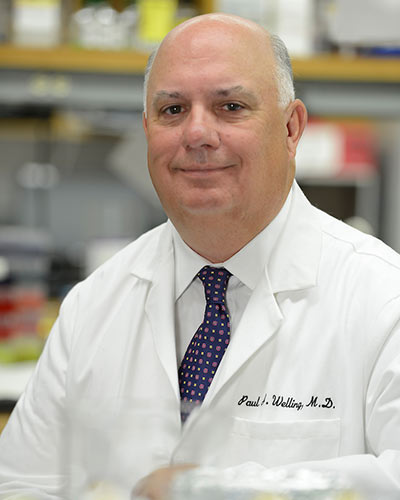June 29, 2017 | David Kohn

Dr. Paul Welling Is Recognized for His Innovative Physiological Research
Paul Welling, MD, a professor of physiology at the University of Maryland School of Medicine (UM SOM), has been named the 2017 Carl W. Gottschalk Distinguished Lecturer of the American Physiological Society. The award recognizes a distinguished scientist who has made major contributions to understanding physiological processes through innovative research.
The award is considered one of the highest honors in physiology. Dr. Welling received his award after giving a lecture on his research at the Experimental Biology Meeting in Chicago on April 24, 2017.
In the lecture, Dr. Welling described his group’s recent discoveries, which have transformed the understanding of potassium balance, and have provided an explanation for the protective effects of dietary potassium on blood pressure.
“Dr. Welling has done an enormous amount to help us understand the relationship between potassium, sodium and blood pressure,” said Scott Thompson, PhD, professor and chair of the UM SOM department of physiology. “His work has been of the highest standard, and he continues to move the needle with his innovative research.”
Dr. Welling has earned international recognition as a leading expert on the molecular mechanisms of renal potassium balance. His laboratory is recognized for elucidating how ion transport molecules in the kidney control electrolyte balance, and for discovering how these molecules go awry in disorders of salt regulation and blood pressure. Dr. Welling is now trying to understand how the kidney senses dietary potassium to regulate salt balance and prevent high blood pressure. His laboratory employs a multidisciplinary approach that includes gene discovery, genomic approaches, in vitro models, genetically engineered mouse models and translational studies in humans.
Two years ago he published a paper on thiazide drugs, a group of salt-lowering medicines used to treat high blood pressure. These drugs are often very effective, and over decades have saved hundreds of thousands of lives. But in some patients, thiazides are not effective. His research revealed a key mechanism for this failure. He and his colleagues found the specific genes and pathways used by the kidneys to compensate for thiazides’ activity. Dr. Welling says it may now be possible to begin developing drugs that affect the mechanisms through which the body counteracts thiazides.
“Prof. Welling thoroughly deserves this important honor,” said Dean E. Albert Reece, MD, PhD, MBA, who is also the vice president for Medical Affairs, University of Maryland, and the John Z. and Akiko K. Bowers Distinguished Professor and Dean of the School of Medicine. “His work has yielded numerous innovations, and has the potential to improve thousands of lives around the globe.”
About the University of Maryland School of Medicine
Commemorating its 210th Anniversary, the University of Maryland School of Medicine was chartered in 1807 and is the first public medical school in the United States and continues today as an innovative leader in accelerating innovation and discovery in medicine. The School of Medicine is the founding school of the University of Maryland and is an integral part of the 11-campus University System of Maryland. Located on the University of Maryland’s Baltimore campus, the School of Medicine works closely with the University of Maryland Medical Center and Medical System to provide a research-intensive, academic and clinically based education. With 43 academic departments, centers and institutes and a faculty of more than 3,000 physicians and research scientists plus more than $400 million in extramural funding, the School is regarded as one of the leading biomedical research institutions in the U.S. with top-tier faculty and programs in cancer, brain science, surgery and transplantation, trauma and emergency medicine, vaccine development and human genomics, among other centers of excellence. The School is not only concerned with the health of the citizens of Maryland and the nation, but also has a global presence, with research and treatment facilities in more than 35 countries around the world. medschool.umaryland.edu/
Learn More
Contact
Office of Public Affairs
655 West Baltimore Street
Bressler Research Building 14-002
Baltimore, Maryland 21201-1559
Contact Media Relations
(410) 706-5260
Related stories

Monday, January 08, 2018
University of Maryland School of Medicine Scientist Receives Top International Research Award for Work on Potassium and Blood Pressure
Paul Welling, MD, a professor of physiology at the University of Maryland School of Medicine (UMSOM), along with his collaborators from around the world, have been awarded a prestigious Transatlantic Network of Excellence grant from the Foundation LeDucq to study why blood pressure is so sensitive to dietary potassium.
